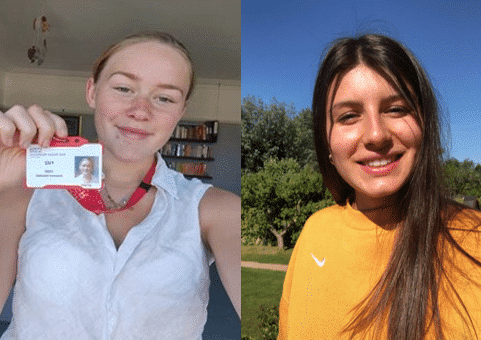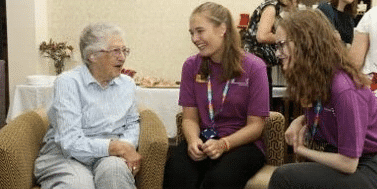
What it’s like to be a young hospital volunteer during Covid-19
We have a huge resource of young people across East Sussex and we are keen to get more of them on board and support them on their volunteering journey, both within our Trust and developing links with their local community services. We do not want to miss out on them, especially at this time. We have a lot to offer our young people and we continue to develop new roles including using the latest technology and chatting to our patients about their heroes – whether that’s Banksy, Captain Tom or Marvel!
We asked two of our young volunteers to share their experiences with us.
Fizz McNally, a volunteer at East Sussex Healthcare NHS Trust:
‘I’m Fizz, I’m 19 and I’m a young volunteer in for East Sussex Healthcare NHS Trust.
I currently volunteer as a chemical pathology lab assistant and I do pre-analytics, so I check samples before they get loaded onto the machines which run the tests. I chose to volunteer initially as I wanted to help the healthcare service amid the COVID-19 crisis. I’ve always loved science and so I knew helping out in the pathology labs would be perfect for me.
Sometimes it can feel like I’m not making much of a difference as I don’t ever see any patients and I rarely read about people’s conditions or reasons for requiring a test. However, every now and then I’ll realize that every sample I see has come from a person with a unique life and a unique problem who needs this test to help them. So, I do what I can with my role to try and help them get those test results more accurate and faster.
I’m going to medical school in October so I’m really enjoying being part of and understanding more about a hospital and how one works. I feel that learning about what happens behind the scenes in the complex process of testing will be invaluable to me in the future. I enjoy understanding a little bit more every week of this complicated system. Couriers, communication with GP practices, Quality Control, Machine maintenance and so much more is required for a functioning pathology department.
Most importantly I’m part of an amazing team and everyone who works there regularly has taken me under their wing to help me out and teach me new things about science, processes and the system. I’ve learnt good workplace dynamics and the positive energy shared by fantastic role models in the department. It’s always interesting to hear their stories about their work events and how changes in the NHS have affected their work in the pathology department. COVID has hugely changed the type and volume of work that we do and the antibody tests coming in soon will cause another big dynamic shift.
I think it’s really important to have young people volunteering in the NHS and it has helped me to consider my options for my career. I didn’t even know how many jobs there were to do in the pathology department let alone the whole hospital! I feel that I am part of something BIG. The feeling of solidarity in hospitals is tangible with everything that’s going on and it’s been really incredible to be a part of that. I know it’s a cliché, but it feels good to do good!! – whether I’m part of a huge change or just helping out a little bit day by day, I feel so much better than doing nothing at all!
I believe that we need young people engaged in our communities and not to be discounted as a generation that’s technology obsessed and lacks perspective. We are an incredibly driven and passionate generation that can do a world of good and social media is our ‘’superpower’’ To unleash our potential we need support, opportunities and inspiration to volunteer.’
Poppy Osman, a volunteer at East Sussex Healthcare NHS Trust:
‘My name is Poppy and I’m currently volunteering in the East Sussex Healthcare NHS Trust. At the moment I’m working in the Pathology department in my local hospital. I first decided to volunteer for the trust when the Coronavirus pandemic meant that there was a possibility that the NHS might be overwhelmed. I wanted to be able to do my bit to help in these uncertain times. I am in my first year of university studying biomedical science in Manchester. Volunteering has not only meant that I can contribute to the fight against Coronavirus, but it has also allowed me to gain experience of working in the NHS, a career path that I could potentially take in the future.
From volunteering in the NHS I have learnt many crucial skills which are useful in the workplace and in daily life. Working in the pathology department is often very fast paced as it is essential to get all the samples analysed on time. I have seen how communication is also key when discussing patient diagnosis. At times it can be hard and getting used to things as a new volunteer can be difficult but I have found from everyone I have worked with that if you are ever unsure, there are so many people willing to help you. There’s no expectation to learn everything at once which makes it much less nerve wracking.
My favourite moment about volunteering so far has been having the opportunity to work with and shadow the biomedical scientists in the laboratory. As biomedical science is the degree I am studying at university, having this opportunity to volunteer is not only a great experience but also something that I find really interesting and enjoyable. I’ve been able to have hands-on experience with organising samples to be sent off to hospitals in London, I have learnt how to start the process of analysing the urgent samples that come in from the hospital wards and also how to use the system to log the samples when they come into pathology reception.
From having this experience, I have improved so many skills including time management to ensure that samples that come into pathology reception are given to the lab as soon as possible. This is really important not only to ensure that there aren’t delays in the patients getting their results but also to ensure that the tests can be done on the sample before it becomes unsuitable for testing. Working in a hospital environment has also meant that I now have experience in a workplace which is different to one a university has to offer. As a young person it is often difficult to get opportunities to gain experience without having specialised training. It is so important that opportunities like this are more widely available to young people as it gives us the best start to our career as we become the scientists, doctors, nurses and teachers of tomorrow.’
East Sussex Healthcare NHS Trust is supported by the Pears #iWill Fund, a match fund created by the Pears Foundation, the National Lottery Community Fund and the Department for Digital, Culture, Media and Sport. The Young Persons Volunteering initiative (16-25 years) at ESHT is also supported by our local voluntary organisations including Hastings Voluntary Action (HVA), East Sussex County Council (ESCC) and Local Clinical Commissioning Group (CCG).

